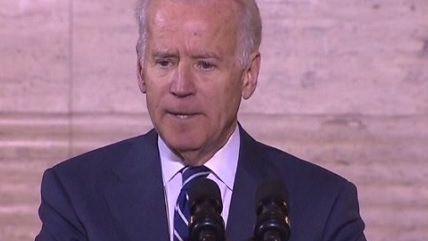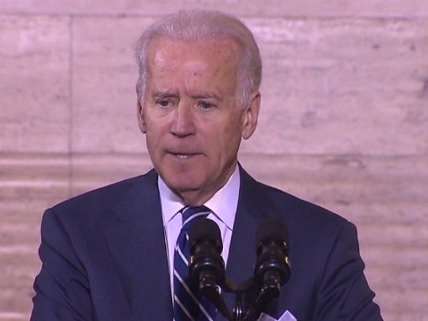So is Joe Biden Running for President or What?
Someone's got to be the Anybody But Clinton candidate, unless they're already in the field.


Whether Vice President Joe Biden makes a run for the presidency—it would be his third try since 1988, when his plagiarism torpedoed his campaign before a single primary—may be one of the last major question marks of the 2016 presidential field. There are 17 "major" candidates for the Republican nomination. Only the top 10 candidates were invited to the first debate, on Fox News, and only the top 10 will be invited to the next debate, on CNN. Between the crowded field, the air Donald Trump is taking up, and the dearth of substantive differences between most of the candidates, even if another one showed up it probably wouldn't make much of a difference.
Not so on the Democratic side, where the RealClearPolitics average of polls has Hillary Clinton with a nearly two-to-one margin over her next competitor, Sen. Bernie Sanders (I-Vt.). Sanders is leading her in the average of New Hampshire polls, but the other three candidates, former Maryland governor Martin O'Malley, former Virginia senator Jim Webb, and former Rhode Island senator and governor, and former Republican, Lincoln Chafee, barely, if even, break 2 percent in the polls.
Then there's Joe Biden, who polls at around 12 percent when he's included (when he's not included, it tends to add more to Sanders' poll numbers than anyone else's). He was supposed to have, maybe, announced by the end of last month. It didn't happen. A Draft Biden campaign's set up shop, focusing on Iowa. Twelve percent is still a quarter of what Clinton's polling, but it's well ahead of other, announced, Democratic candidates. And it's better than Biden's ever done before. He finished at one percent in Iowa in 2008, below the eventual nominee, Barack Obama, the then long-time frontrunner, Hillary Clinton, John Edwards, and even Bill Richardson, who also hit low single digits. In 1987, he was polling at 2.3 percent, below Al Gore, the 1992 and 1996 vice presidential and 2000 presidential nominee, at 3.4. It's a low bar he's set. Vox.com pointed out this morning that Biden has no natural constituency and that Democratic voters don't want him—the closest he's come to Clinton since 2012 in an ongoing series of Huffington Post polls is 27 percent behind.
And yet the latest Joe Biden news includes the president reportedly giving him his "blessing" to run if he wanted to, Biden inviting top Democratic fundraisers to a meeting at the Naval Observatory, and the White House saying it wouldn't rule out a primary endorsement from the president. President Obama being in full legacy mode, it's difficult to imagine him endorsing anyone other than the man he put "one heartbeat away" from the presidency, if he does make an endorsement. In either case, it's not just House Republicans investigating Clinton's practices as secretary of state, but the Obama administration too.
In 2008, with defeat almost certain, Clinton suggested she should keep running because sometimes nominations aren't settled until late in the race—1968 presidential candidate Bobby Kennedy, she pointed out, was assassinated in June. After widespread criticism, she said she regretted her comments. But it doesn't take an assassination to throw a primary into disarray; career-ending scandal is far more likely, and plausible, if still improbable. Democrats have the five declared candidates to choose from, provided none drops out before January. Deadlines for filing state primaries, meanwhile, are coming up, starting in November. Even meeting those requires campaign infrastructure. Being an alternative candidate may be more appealing to Joe Biden himself than to Democratic voters, but it is appealing.
There's always Gore.


Show Comments (50)